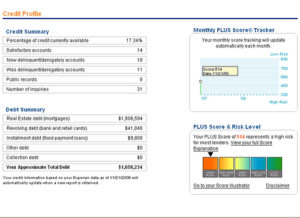 The credit history is an important factor for your insurance score. Sometimes it would be advantageous to not have it checked. However, this is not likely to happen. Image: Flickr.
The credit history is an important factor for your insurance score. Sometimes it would be advantageous to not have it checked. However, this is not likely to happen. Image: Flickr.
Does having a bad credit history make you a reckless driver or an extremely high risk homeowner?
Maybe it does, and maybe it does not. But, recent studies have shown that there is a statistical correlation that shows there is a link between your credit history or credit score and your risk to insurance companies. Most insurance company use
your credit history to determine your auto insurance and home insurance premium rates, which is exactly why you’re probably coming up short if you’re looking for ‘no credit check auto insurance’ – quite simply, it doesn’t really exist.
Many insurance customers do not realize that their credit scores and the negative attributes of their credit reports affect how much they pay in home and car insurance premiums. One of the main problems is that it is a mystery as to how most insurance companies comprise your car insurance
premiums.
The formulas and algorithms uses by the insurance companies are proprietary and specific to each individual insurance company. I recently talked to my own car insurance company about receiving a discount specifically for my great credit score, but I was told that it was already factored into my home and car insurance premiums. But, the question still remains, why does your credit score matter when determining your premiums?
Credit Scores Are Correlated To Insurance Risk
Insurance companies have a large database of information about their customers, their habits, and the amount of insurance claims they file. Insurance companies and their legions of statisticians have been able to tease out data that correlates, or very closely relates to another attribute.
Through a mountain of data, insurance companies have been able to determine that customers with a low credit score have a much greater likelihood of living a riskier life than normal and are more likely to file more insurance claims which ultimately cost the insurance companies more money.
Your Credit Score Is Just Another Identifying Feature
 Credit scores correlate with insurance risk. This for insurers take this factor into their calculations by default. Image: Flickr.
Credit scores correlate with insurance risk. This for insurers take this factor into their calculations by default. Image: Flickr.
The use of a customer’s credit score to determine their home insurance and car insurance premiums have many up in arms. There have even been conversations in Congress about barring the practice. But, the use of credit score as category for insurance rating is a variable just like any other variable.
Should insurance companies be barred from using gender or age to determine the likelihood of claims and subsequently car insurance premiums and other insurance premiums? In fact, many countries around the world have adopted the policy barring insurance companies from discriminating between males and females. So, maybe denying the use of a person’s credit score is not too far behind.
It’s A Good Business Practice For Insurance Companies
If you could predict with fairly reasonable accuracy when the stock market would most likely go up in value, you would pile on your investments. It is just good business sense. The same is true for any business as well.
If the business can determine through statistics that they have a better chance of making a profit if they do one thing over another, then a business owner or manager would be remiss if they didn’t do that thing. Investors would be outraged.
Insurance companies have found that statistical correlation between the amount of risk they take and how good a person they insure and his credit report. It is a sound business decision to include credit history into an insurance company’s pricing model.
Each Insurance Company Views Your Credit Differently
Although credit is now a standard factor just like the type of your car is when you’re getting insurance quotes, it’s important to remember that how an insurance company evaluates your credit score and the information in your credit report will vary from company to company.
Each insurance company has their own formula that they use to calculate your insurance premiums, and your credit score factors into each one in a varying amount. A low credit score could mean that you end up paying an additional 20% or more on car and home insurance premiums.
Your insurance policies is priced not only for your potential to damage your car or home but also for your your likelihood to file for a claim. Additionally though, keep in mind that insurance companies are constantly developing their pricing models to use data and statistically calculate your riskiness
Higher Car Insurance Premiums May Compound Problems
One drawback to charging a customer a higher insurance premium based solely on credit score is that it may compound a person’s problem. People have a poor credit score because of problems paying their bills. Raising someone’s insurance rates because of a higher credit score may exacerbate their problems. If a person is having trouble paying his or her bills, how will they be able to successfully pay an increase in their insurance premiums?
There are a ton of variables that go into the calculations of car insurance premiums and homeowner’s insurance premiums. The insurance companies in America look at tons of attributes in the hopes of determining who exactly are good risks to provide insurance for in order to maximize their profits and limit their claims losses. The insurance companies are not evil, but they are companies who have to answer to shareholders and other stakeholders.
While there is often debate about whether credit scores really reflect the riskiness of a person’s future debt performance, insurance companies continue to use the data to set their rates. The reality is that they have to make a profit too in order to provide coverage to policyholders, and using credit scores can help determine who may be extraordinarily high risks to insure.